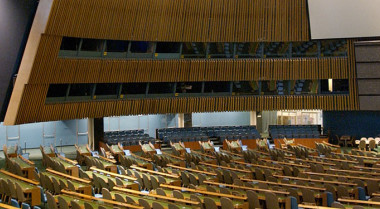
Building strong and operational partnerships with local peacebuilders in the pursuit of more impactful peacebuilding action
It is widely agreed by the international community that peacebuilding is more impactful when it is locally-led, because local peacebuilders – diverse national, sub-national and community-based actors who rely on conflict analysis in driving their strategies and programming – are critical to understanding the needs and values of communities impacted by conflict and fragility.
Since the establishment of the peacebuilding and sustaining peace agenda, the UN and its Member States have suggested initiatives and policies that provide an opportunity to achieve meaningful participation of local peacebuilders in an effort to achieve sustaining peace. However, these strategies have not always been operationalised or proven to be effective to secure the agreed-upon role of local peacebuilders in sustaining peace.
Facilitating effective support to local peacebuilders must encompass a peacebuilding policy that supports local peacebuilders’ active participation, financial independence, and legal protection.
Active and meaningful participation of local peacebuilders constitutes the inclusion of local peacebuilders in multilateral negotiations, with a feedback loop and equal opportunity to influence the processes. Although local peacebuilders have been recognised as meaningful partners to UN peacebuilding efforts, their engagement continues to be ad-hoc and not systematised. The only solution to this issue is to meaningfully operationalise commitments made, using tools that are already in existence within the UN System.
Beyond the lack of systematic and meaningful participation, the current financial mechanisms prevent local peacebuilders from realising their full potential. Donors should adopt new financial practices that are less burdensome and more flexible for local peacebuilders. Further, these practices should focus on longer-term change. This should be coupled with efforts to establish authentic partnerships with local peacebuilders and shift the mindset away from regarding local peacebuilders solely as implementers of someone else’s ideas.
Participation and resourcing must be linked to legal protections that recognise the unique situation of local peacebuilders. The current protection language is not yet clearly distinguish between local peacebuilders and human rights defenders, for example. This undermines their position and prevents them from achieving their full potential as the nature of their work is misunderstood. A dedicated initiative by national governments, with the UN technical assistance, should be undertaken to recognise and address the protection needs of local peacebuilders.
The commitment to integrate local peacebuilders requires a shift in international policy. This shift could be operationalised by using ongoing processes within the UN System to:
- Include local peacebuilders at all stages at all levels of the peacebuilding work of the UN, Member States and their peacebuilding partners. This requires local peacebuilders to have the principal authority and influence over the strategy, implementation, evaluation, and resource allocation in peacebuilding interventions, consultation and policy making.
- Continue recognising local peacebuilders and their work in all UN documents on peacebuilding and sustaining peace, acknowledging their specific needs and context of their work.
- Ensure that the UN processes on financing for peacebuilding guarantee adequate, predictable and quality financing for local peacebuilders, including the existence of financial support mechanisms that guarantee that the money available for local peacebuilders’ ownership over sustaining peace.
- Develop international legal frameworks that provide specific and effective protection to local peacebuilders.



